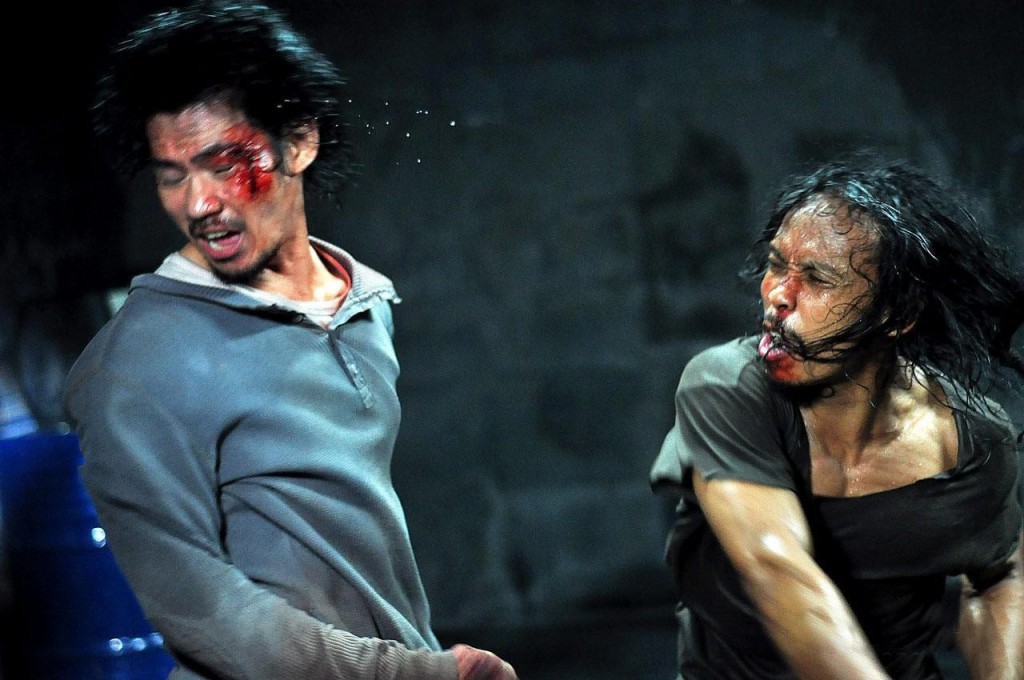Review: The Raid: Redemption (2012)
There’s seems to be a lot of talk going on nowadays about how modern action films are descending into nothing more than glorified video games. This is complete nonsense.
However advanced video games become, they are completely different beasts than movies, especially regarding action. I don’t want to go into depth on this subject here, but since such video game connections seem to be a part of the conversation regarding The Raid: Redemption — perhaps the most audaciously streamlined action move in years — it is worth addressing.
Video games are an active experience in a way that movies are not. That’s not to say that you are a passive viewer of a movie, but a video game is all about the control, the choices, and the immersion of the player. In a movie, you have no control over where the story goes or how the events proceed. The action thrills you, but the action is also removed from you. You are thrilled by seeing others triumph, not by triumphing. Action games like Modern Warfare and Halo are far more similar to organized sports than movies. They are all about the experience, the adrenaline, the camaraderie with fellow gamers online and the competition between you and them.
Games are about repetition, improvement, levels, and the illusion of your control over everything. The story is a means of immersing you in the action. While an action film like The Raid certainly shares this tenuous relationship with story and is a visceral experience for the audience, comparing it to a video game yields nothing more than stating that it has relentless, constant action, and is light on story. But you could easily just say that and leave the video game comparison out of the equation altogether with no meaning lost.
Most critics complaining that modern action films are like video games have likely never played a video game and have no desire to do so. Thus, for them, comparing an action film to a video game is merely shorthand for calling the film idiotic.
I’m sorry to have addressed this issue for so much longer than I intended to, but I am sick of the comparisons to video games. They yield nothing and are a waste of time. As well, there is little to say about a film as simple and effective as The Raid, and so my critical attention is as well spent discussing this trend in film criticism.
Go see The Raid and you will get a sense of the visceral punch this inventive martial arts film packs, and that no review, however filled with gut-punching, jaw-dropping explosive language, can ever convey.
The story is elegantly simple: a swat team of Indonesian cops raids an apartment complex in order to take down a drug lord. However, the drug lord is ready for them and unleashes the apartment’s bloodthirsty denizens upon the cops. The swat team is trapped and has to fight its way out. The plot revolves around Iko Uwais, an Indonesian martial arts star, as Rama, a rookie cop, but there is very little in way of plot here. However misguided his critical pan of the film is, Roger Ebert is correct in observing that the film only offers guideposts of a plotline. The opening minutes of the film establish that Rama has a pregnant wife, but this is never developed. It is merely motivation for the main character. There is a betrayal halfway through the film, but that betrayal is not developed. It merely precipitates more action.
The film runs 101 minutes, and I feel like action scenes take up at least 85 per cent of that runtime. Luckily, the action scenes are expertly done. I was unaware of silat, an Indonesian martial art, before seeing this film, and certainly was not ready for the sheer amount of bone-cracking, head-splitting, body-throwing action this martial art consists of. Simply put, this is some of the best martial arts action I’ve ever seen, and I’ve seen a lot of kung fu movies. The ultimate merit of a martial arts film depends on its fight scenes, and The Raid more than delivers in this capacity as almost its entirety consists of fights.
Every action scene is inventive in how it lets Rama dispose of the villains, but unlike most American action movies, it also understands the spatial orientation of the characters fighting. We know where the characters are in the frame and the geography of the apartment, and are actually able to see what they are doing. The camera is moving and the editing is quick, but the camerawork and editing never hinder us from appreciating the physical stamina and prowess of the characters onscreen. The film is even clever in its gunfights, using the muzzle flashes in one stairwell scene to light up the darkened room in disjointed slow motion.
It is rare to see a film that actually delivers on its promise of nonstop action. Should we be so quick to congratulate filmmakers who are only interested in delivering nonstop chaos and gruesome violence? Perhaps not, but when the product is this exhilarating and well crafted, it would be dishonest to reject it on moral grounds. Just sit back and enjoy the martial arts spectacle.
8 out of 10
The Raid: Redemption (2012)
Written and directed by Gareth Evans; starring Iko Uwais, Joe Taslim, Doni Alamsyah, and Yayan Ruhian.
